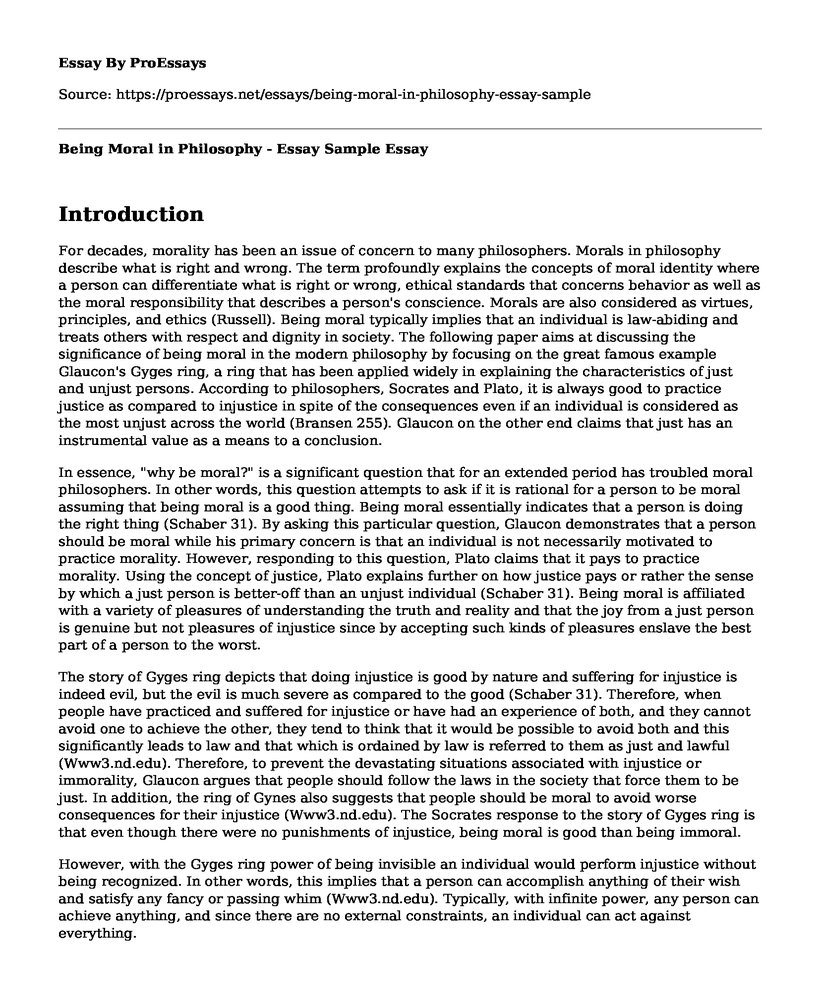Introduction
For decades, morality has been an issue of concern to many philosophers. Morals in philosophy describe what is right and wrong. The term profoundly explains the concepts of moral identity where a person can differentiate what is right or wrong, ethical standards that concerns behavior as well as the moral responsibility that describes a person's conscience. Morals are also considered as virtues, principles, and ethics (Russell). Being moral typically implies that an individual is law-abiding and treats others with respect and dignity in society. The following paper aims at discussing the significance of being moral in the modern philosophy by focusing on the great famous example Glaucon's Gyges ring, a ring that has been applied widely in explaining the characteristics of just and unjust persons. According to philosophers, Socrates and Plato, it is always good to practice justice as compared to injustice in spite of the consequences even if an individual is considered as the most unjust across the world (Bransen 255). Glaucon on the other end claims that just has an instrumental value as a means to a conclusion.
In essence, "why be moral?" is a significant question that for an extended period has troubled moral philosophers. In other words, this question attempts to ask if it is rational for a person to be moral assuming that being moral is a good thing. Being moral essentially indicates that a person is doing the right thing (Schaber 31). By asking this particular question, Glaucon demonstrates that a person should be moral while his primary concern is that an individual is not necessarily motivated to practice morality. However, responding to this question, Plato claims that it pays to practice morality. Using the concept of justice, Plato explains further on how justice pays or rather the sense by which a just person is better-off than an unjust individual (Schaber 31). Being moral is affiliated with a variety of pleasures of understanding the truth and reality and that the joy from a just person is genuine but not pleasures of injustice since by accepting such kinds of pleasures enslave the best part of a person to the worst.
The story of Gyges ring depicts that doing injustice is good by nature and suffering for injustice is indeed evil, but the evil is much severe as compared to the good (Schaber 31). Therefore, when people have practiced and suffered for injustice or have had an experience of both, and they cannot avoid one to achieve the other, they tend to think that it would be possible to avoid both and this significantly leads to law and that which is ordained by law is referred to them as just and lawful (Www3.nd.edu). Therefore, to prevent the devastating situations associated with injustice or immorality, Glaucon argues that people should follow the laws in the society that force them to be just. In addition, the ring of Gynes also suggests that people should be moral to avoid worse consequences for their injustice (Www3.nd.edu). The Socrates response to the story of Gyges ring is that even though there were no punishments of injustice, being moral is good than being immoral.
However, with the Gyges ring power of being invisible an individual would perform injustice without being recognized. In other words, this implies that a person can accomplish anything of their wish and satisfy any fancy or passing whim (Www3.nd.edu). Typically, with infinite power, any person can achieve anything, and since there are no external constraints, an individual can act against everything.
Conclusion
In conclusion, morals play a prominent role in modern philosophy in helping people distinguish what is right and wrong. The Glaucon allegory of the ring is still relevant in today's society since it relates to what is anticipated for individuals with power over others. However, practicing justice is better than being an injustice.
Works Cited
Bransen, Jan. "Albury Castell, Donald Borchert and Arthur Zucker, eds., An Introduction to Modern Philosophy. Examining the Human Condition, Reviewed by." (1994).
Russell, Bertrand. History of western philosophy: Collectors edition. Routledge, 2013.Schaber, Peter. "Why Be Moral: A Meaningful Question?." Why Be Moral? (2015): 31.
Www3.nd.edu."Why shoul one be ethical?" The Rings of Gyges. Accessed from https://www3.nd.edu/~dpattill/Courses/Intro%20Fall%2015/Slides/Meta-Ethics%20Slides.pdf 11 February 2019
Cite this page
Being Moral in Philosophy - Essay Sample. (2022, Nov 22). Retrieved from https://proessays.net/essays/being-moral-in-philosophy-essay-sample
If you are the original author of this essay and no longer wish to have it published on the ProEssays website, please click below to request its removal:
- Paper on Religion Issue: Identity and Ethics of Ministers
- Course Work Sample - Dialogue Paper: Plato and Skinner
- Approaches to Ethics Paper Example
- Paper Example on Rene Descartes, Meditations on First Philosophy
- Ethical Values and Challenges in Decision Making Paper Example
- Literary Analysis Essay on Gorgias
- Essay on Exploring Identity: How Essentialism and Social Constructivism Relates to Race







